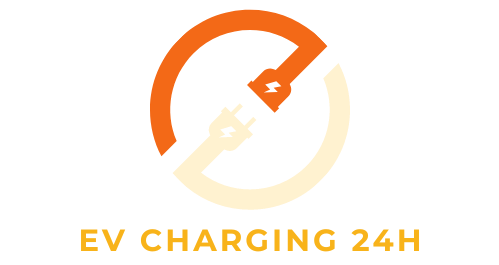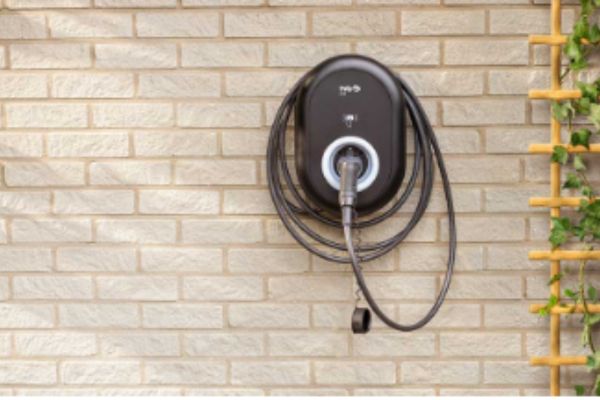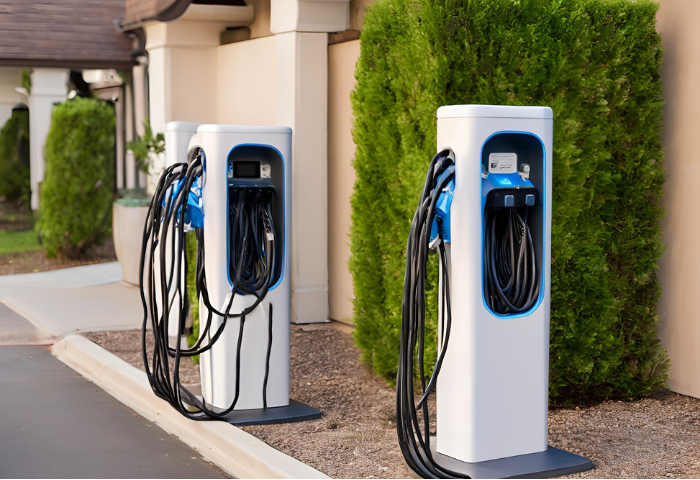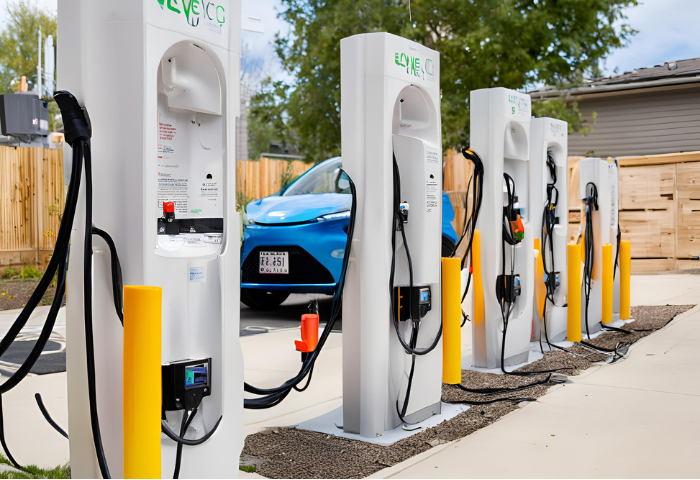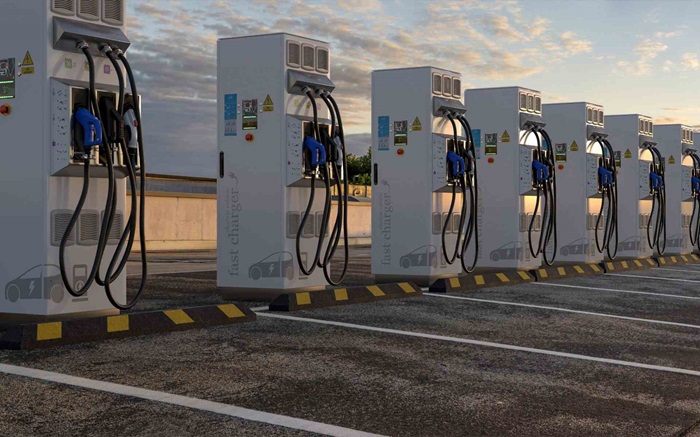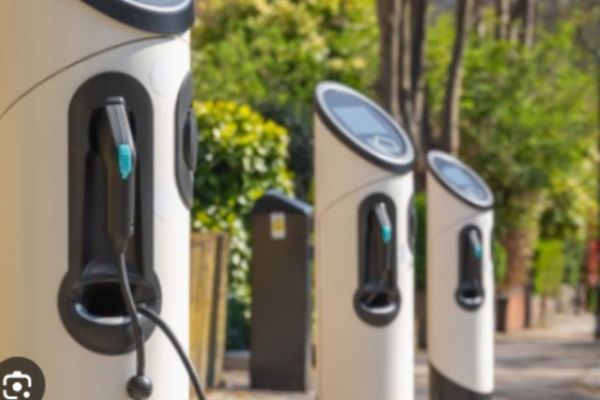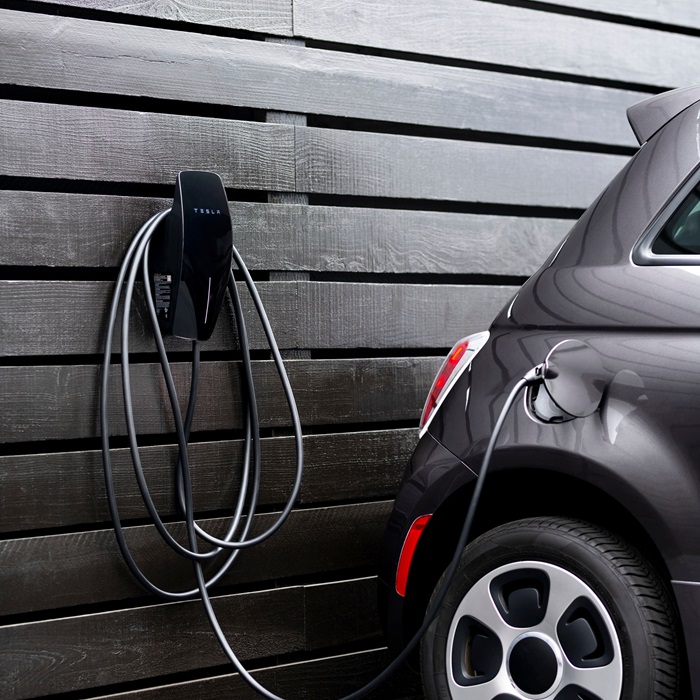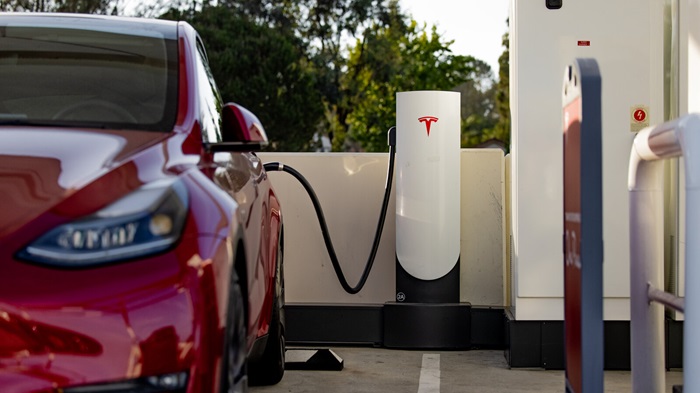In-Depth Smart EV Charger Review: Everything You Need to Know Before Buying
Exploring the latest smart EV charger options can be a daunting task, which is why in-depth reviews are essential for making an informed decision. Our smart EV charger reviews delve into the performance, features, and overall value of the top models on the market today.
We assess everything from installation ease to integration with smart home systems, ensuring you understand how each charger stands up to real-world demands. Whether you’re a first-time EV owner or looking to upgrade your current setup, these reviews provide the insights needed to choose the best
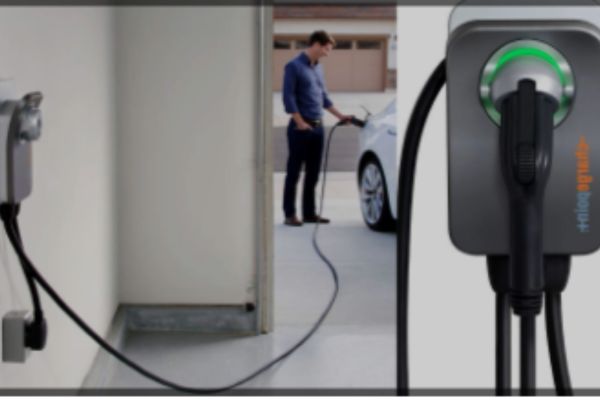
Introduction
Whether you’re rapidly evolving landscape of electric vehicles (EVs), one critical aspect often overlooked is the choice of the right EV charger. While it might seem trivial compared to the excitement of driving an EV, selecting the appropriate charger can significantly impact both efficiency and convenience.
The importance of choosing the right EV charger is paramount.
Efficiency and convenience are paramount when it comes to EV charging. The right charger ensures that you can charge your vehicle quickly and reliably, minimizing downtime and maximizing your driving range. Moreover, it can help optimize energy usage, reducing electricity costs and environmental impacts.
This article provides an overview of advancements in smart EV charging technology.
Smart EV charging technology has made remarkable strides in recent years, revolutionizing the way we power our electric vehicles. These advancements encompass various aspects, including connectivity, efficiency, and the user experience.
One significant innovation is the integration of smart features into EV chargers. These chargers can communicate with both your vehicle and the grid, allowing you to make dynamic charging adjustments based on things like electricity prices and grid demand. This not only saves money for EV owners but also helps balance the grid by reducing peak loads.
Furthermore, smart chargers often come equipped with mobile apps or online platforms that allow users to monitor charging sessions remotely, schedule charging times, and receive notifications. This level of control and visibility enhances convenience and enables more efficient management of charging habits.
Another notable development is bidirectional charging, which allows EVs to not only receive energy from the grid but also discharge energy back into it. This capability opens up possibilities for vehicle-to-grid (V2G) applications, where EVs can serve as mobile energy storage units, contributing to grid stability and resilience.
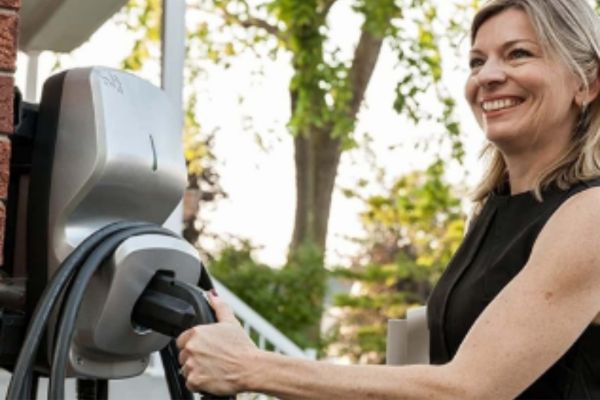
Understanding smart EV chargers
What is a smart EV charger?
A smart EV charger is an advanced charging device equipped with intelligent features that enhance the charging process for electric vehicles. Unlike traditional chargers, which simply provide a means to deliver electricity to the vehicle’s battery, smart chargers incorporate technology to optimize charging efficiency, enable remote monitoring and control, and facilitate integration with the grid.
The basic functions of a smart EV charger are as follows:
- Connectivity: Smart chargers are connected devices that can communicate with other devices, such as the EV itself, mobile apps, and energy management systems. This connectivity allows for remote monitoring and control of charging sessions.
- Dynamic Charging: Smart chargers can adjust charging rates based on a variety of factors, including electricity prices, grid demand, and renewable energy availability. This ensures that EV owners can take advantage of off-peak rates and minimize their electricity costs.
- Scheduling: Smart chargers allow users to schedule charging sessions according to their preferences and energy requirements. This feature allows for more efficient use of electricity and can help avoid peak demand periods.
- Data Monitoring: Smart chargers provide detailed information on charging sessions, including energy consumption, charging duration, and cost. This information allows users to track their charging habits and optimize their energy usage.
Advantages over Traditional Chargers:
Smart EV chargers offer several advantages over traditional chargers, including:
- Increased Efficiency: By dynamically adjusting charging rates and optimizing energy usage, smart chargers can charge EVs more efficiently, reducing charging times and electricity costs.
- Enhanced Convenience: Remote monitoring and control capabilities make it easier for EV owners to manage their charging sessions from anywhere, using mobile apps or online platforms.
- Grid Integration: Smart chargers can communicate with the grid to support grid balancing and renewable energy integration. This enables more sustainable charging practices and helps reduce the overall environmental impact of EVs.
Safety Features and Certifications
Safety is paramount when it comes to EV charging, and smart chargers come with a range of safety features to ensure reliable and secure operation. Some essential safety features include:
- Overcurrent Protection: Mechanisms in smart chargers guard against overcurrent, which can harm a vehicle’s battery or create a fire hazard.
- Ground Fault Protection: It detects and interrupts current leakage.
- Temperature Monitoring: Smart chargers monitor the charging components’ temperatures.
Certification: Choosing smart chargers certified by recognized standards organizations like UL (Underwriters Laboratories) or CE (Conformité Européenne) is crucial. These certifications ensure that the charger meets stringent safety and performance standards.
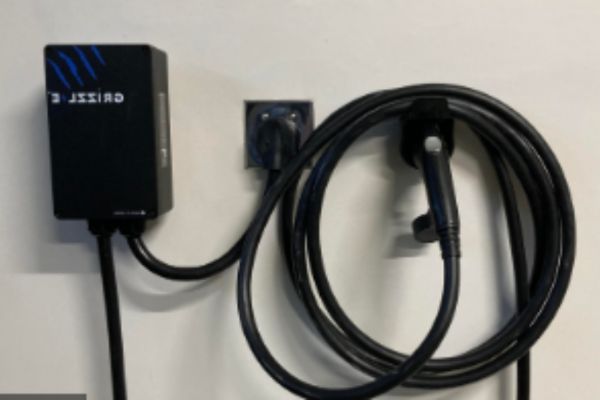
Detailed reviews of the top smart EV chargers are available.
ChargePoint Home Flex
- Efficiency: The ChargePoint Home Flex is highly efficient, with adjustable power levels ranging from 16 to 50 amps, allowing users to optimize charging speed based on their needs and electrical infrastructure.
- It comes equipped with smart features, such as connectivity to the ChargePoint app, allowing users to remotely monitor and schedule charging sessions. It also integrates with smart home systems like Alexa for voice control.
- Cost: While the initial cost may be higher compared to some other options, the flexibility and smart capabilities of the ChargePoint Home Flex justify the investment for many users.
- Users praise the ChargePoint Home Flex’s reliability and ease of use, particularly its seamless integration with the ChargePoint network and user-friendly mobile app.
Tesla Wall Connector
- Efficiency: The Tesla Wall Connector boasts high efficiency and charging speeds, delivering up to 44 miles of range per hour. Specifically designed for Tesla vehicles, it optimizes compatibility and performance.
- Smart Features: Tesla’s Wall Connector integrates seamlessly with the Tesla mobile app, allowing users to monitor and control charging remotely. It also supports Tesla’s advanced features like scheduled charging and preconditioning.
- Cost: While the Tesla Wall Connector may have a higher upfront cost, it provides exceptional performance and compatibility for Tesla owners, making it a worthwhile investment for many.
- User Reviews: Tesla owners appreciate the reliability and convenience of the Wall Connector, praising its sleek design, fast charging speeds, and seamless integration with the Tesla ecosystem.
Emporia Smart EV Charger
- Efficiency: The Emporia Smart EV Charger offers efficient charging with adjustable power levels and smart scheduling features.
- Smart Features: It comes equipped with Wi-Fi connectivity and integrates with the Emporia app, allowing users to remotely monitor and control charging sessions. It also supports energy management features for grid integration.
- Cost: The Emporia Smart EV Charger provides excellent value for its features, offering competitive pricing compared to other smart chargers on the market.
- User Reviews: Users commend the affordability and reliability of the Emporia Smart EV Charger, highlighting its user-friendly interface and robust smart capabilities.
FLO Home X5
- Efficiency: The FLO Home X5 offers efficient charging with adjustable power levels and advanced load management features to optimize energy usage and reduce charging times.
- Smart Features: It comes with built-in Wi-Fi connectivity and integrates with the FLO app, allowing users to remotely monitor and manage charging sessions. It also supports features like scheduled charging and energy usage tracking.
- Cost: While the initial cost may be higher, the FLO Home X5 offers premium features and build quality, justifying the investment for users seeking a reliable and advanced charging solution.
- User Reviews: Users praise the reliability and performance of the FLO Home X5, particularly its robust construction, fast charging speeds, and intuitive app interface.
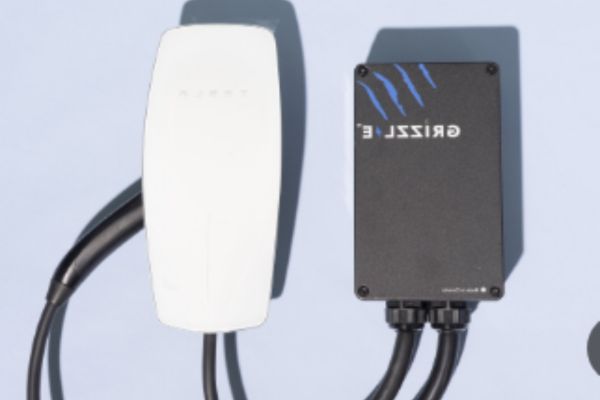
User Interface and App Integration
We are conducting an analysis of the digital user interface for each charger.
The digital user interface of smart EV chargers plays a critical role in enhancing the user experience by providing intuitive navigation and real-time information about charging status, energy consumption, and more.
Clearness and simplicity guide the design of modern interfaces, which frequently include touchscreens or LED displays that let users easily monitor their charger’s performance and change settings to suit their needs.
Some chargers also integrate voice command capabilities, making them compatible with smart home systems like Amazon Alexa or Google Home, adding an extra layer of convenience.
The associated mobile apps offer various features and functionalities.
The mobile apps associated with smart EV chargers are integral to maximizing the functionality of the devices. With these apps, users can start or stop charging remotely, schedule charges during off-peak hours to benefit from lower electricity rates, and receive notifications about the charging status or when the vehicle reaches full charge. Here are some common and impactful features found in these apps:
- Remote Monitoring and Control: Users can check the current status of their EV’s charge and command the charger remotely, offering ultimate convenience and flexibility.
- Scheduling: To optimize energy use and cost, users can schedule charging sessions based on their daily routine or in response to electricity’s dynamic pricing.
- Usage Statistics: Apps often provide detailed statistics on usage patterns, the cost of charging sessions, and even carbon footprint reductions, which can help users optimize their charging habits.
- Many apps also integrate with broader home energy management systems, allowing users to see their overall energy consumption and manage it effectively.
- Firmware Updates: Through the app, users can easily update their charger’s firmware to ensure they are using the latest software, which might include new features or security enhancements.
- Customer Support: The app provides direct access to support and troubleshooting guides, which improves the user experience and ensures that help is readily available when needed.
Buying Guide: What to Look for in a Smart EV Charger
When considering the purchase of a smart EV charger, there are several key factors to evaluate to ensure you get the best fit for your needs and priorities. This guide will help you navigate through the essential aspects, from installation requirements to compatibility with renewable energy sources.
Installation Requirements
- To ensure compatibility with your home’s existing electrical system, check the charger’s electrical requirements. Most home chargers require a 240V outlet, and some might need a dedicated circuit.
- Professional vs. DIY Installation: While some chargers are designed for easy DIY installation, others may require professional installation, especially if upgrades to your home’s electrical panel or wiring are necessary. When making your choice, consider the installation’s complexity and the cost of hiring a professional.
Energy Efficiency and Environmental Impact
- Energy Conservation: Look for chargers that have a high energy efficiency rating. Some chargers come with features like adjustable charging rates or a standby mode that minimizes energy consumption when not actively charging.
- Environmental Footprint: Assess the charger’s materials and manufacturing processes. The environmental impact is lower for chargers made with recyclable materials and designed for long-term durability.
Cost of ownership and ROI
- Initial Purchase and Installation Costs: These can vary widely depending on the model and installation requirements. Factor in any available rebates or incentives that can reduce the upfront cost.
- Operating costs: Consider the charger’s efficiency and how it will affect your electricity bills. Some smart chargers permit charging during off-peak hours to take advantage of lower rates.
- Return on Investment (ROI): Calculate the long-term savings from using an EV charger at home versus relying on public charging stations. Include the potential increase in property value due to the installation of a home EV charger.
Compatibility with Renewable Energy
- Solar Integration: If you have or are considering solar panels, choose a charger that can directly integrate with your solar system to maximize the use of renewable energy.
- Other Renewable Sources: Some chargers are designed to be compatible with other forms of renewable energy, such as wind or hydropower, providing further flexibility and sustainability.
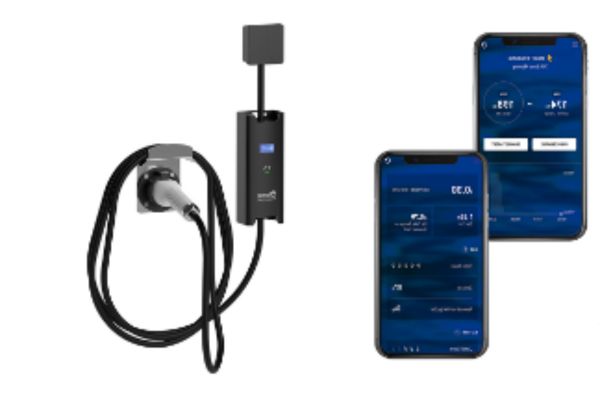
Smart Features and Connectivity
Scheduled Charging, Load Balancing, and Real-Time Monitoring
Smart EV chargers offer a suite of intelligent features designed to optimize energy use and manage power distribution effectively.
Scheduled charging allows users to set specific charging times in order to take advantage of lower electricity rates during off-peak hours or when renewable energy production is at its peak.
Load balancing is crucial for households with multiple electric vehicles or high overall energy consumption, as it dynamically adjusts the power flow to the charger to prevent circuit overload and optimize charging based on current energy usage.
Smartphone apps enable users to access real-time monitoring, which enhances user convenience and control by providing instant feedback on the charging process, energy usage, and operational status.
The system offers Wi-Fi connectivity and is compatible with home automation systems.
Wi-Fi connectivity in smart EV chargers facilitates seamless integration with home Wi-Fi networks, enabling remote management and updates. This connectivity is essential for integrating the charger with home automation systems, such as smart thermostats and lighting systems, allowing for a unified management platform via common ecosystems like Google Home, Amazon Alexa, or Apple HomeKit. This integration enables users to automate and optimize their home energy usage in a comprehensive way.
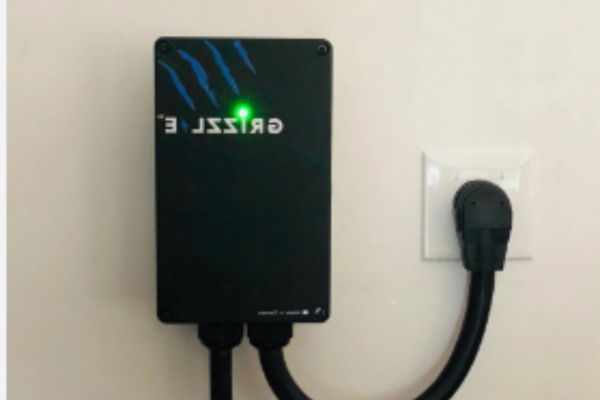
Safety and reliability
Look in-depth at built-in safety features and operational reliability.
Electrical devices prioritize safety, and smart EV chargers incorporate numerous safety features to guarantee dependable operation. These include overcurrent protection, ground fault circuit interruption (GFCI), temperature monitoring, and automatic shut-off capabilities to prevent overheating or electrical faults.
Robust construction and compliance with international safety standards, such as UL or CE marking, often enhance the reliability of these chargers, ensuring their durability and safe operation over time.
Environmental conditions have a significant impact on charger performance.
The performance of smart EV chargers can vary significantly with different environmental conditions. Factors such as extreme temperatures, humidity, and exposure to elements like rain and snow can affect the efficiency and lifespan of outdoor chargers.
Ratings like IP65 or IP67 for dust and water resistance certify many high-quality smart EV chargers to withstand a wide range of environmental conditions. Users should carefully consider their local climate and select chargers designed to function reliably in those specific conditions.
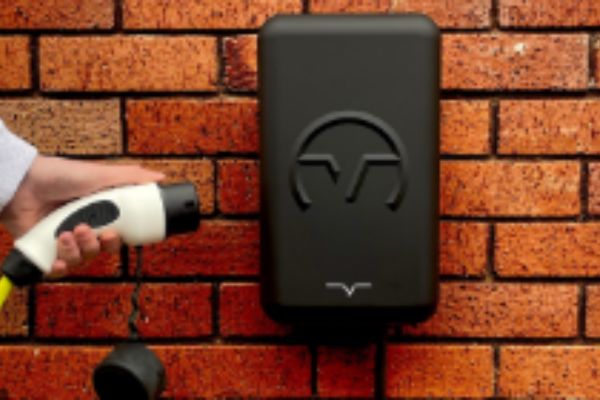
Product comparisons and market trends
Comparative Analysis
Several factors come into play when comparing the performance, features, and value of smart EV chargers:
Performance: Typically, we measure charging speed, efficiency, and reliability. Chargers like the Tesla Wall Connector and ChargePoint Home Flex offer high charging speeds and efficiency, catering to users who prioritize fast and reliable charging. However, newer models like the Emporia Smart EV Charger and FLO Home X5 also deliver impressive performance with adjustable power levels and advanced load management features.
Features: Smart features play a crucial role in enhancing the user experience and convenience. All four chargers offer smart capabilities such as remote monitoring, scheduling, and integration with mobile apps. However, the Tesla Wall Connector stands out with its seamless integration with the Tesla ecosystem, offering advanced features like scheduled charging and vehicle preconditioning.
Value: The combination of performance, features, and pricing determines value. While chargers like the Tesla Wall Connector may have a higher upfront cost, they offer exceptional value for Tesla owners with their compatibility and advanced features. On the other hand, chargers like the Emporia Smart EV Charger and FLO Home X5 provide competitive pricing without compromising on performance or features, making them attractive options for budget-conscious consumers.
Market Trends and Evolving Consumer Preferences
Increased Demand for Smart Features: As electric vehicles become more popular, there is a corresponding increase in demand for smart EV chargers with advanced features such as remote monitoring, scheduling, and energy management. Consumers are increasingly seeking chargers that offer convenience and flexibility in managing their charging needs.
Focus on Sustainability: When choosing EV chargers, sustainability is becoming a critical consideration for consumers. There is a trend towards chargers with energy management features, grid integration capabilities, and support for renewable energy sources. Consumers are looking for ways to reduce their environmental footprint and maximize the use of clean energy in charging their vehicles.
Integration and Compatibility: For consumers, integration with existing smart home systems and vehicle ecosystems is becoming increasingly important. Consumers prefer chargers that seamlessly integrate with popular platforms such as Tesla’s ecosystem or smart home assistants like Alexa and Google Assistant because they provide a cohesive user experience and greater convenience.
Affordability and Accessibility: While premium chargers with advanced features continue to attract attention, there is also a demand for more affordable options that provide basic functionality without breaking the bank. Manufacturers are responding by offering a range of chargers at different price points to cater to diverse consumer preferences and budgets.
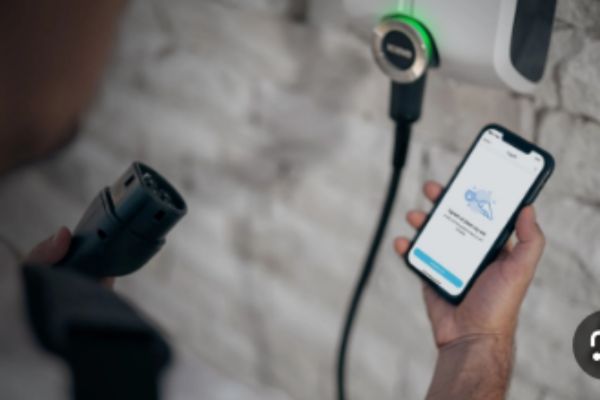
Warranty, Support, and Consumer Feedback
Warranty Offerings and Customer Support Services
When purchasing a smart EV charger, understanding the warranty terms is essential. Most reputable manufacturers offer warranties that cover a range of potential issues, from manufacturing defects to performance guarantees, typically ranging from one to five years.
Additionally, comprehensive customer support services, including 24/7 hotline access, online chat, and detailed FAQs and troubleshooting guides, provide invaluable help to users navigating installation or operational challenges.
Consumer Testimonials and Real-World Usage Feedback
Consumer feedback is a vital resource for prospective buyers. Reviews and testimonials often highlight the real-world reliability, ease of use, and efficiency of smart EV chargers. Potential buyers should look for feedback on how well chargers perform under different conditions, the user-friendliness of associated apps, and the effectiveness of customer support. Online forums, product review sites, and social media platforms are excellent sources for gathering this type of user feedback.
Special Considerations
For Tesla owners
Tesla vehicles, which come with a proprietary charging connector, require specific considerations. Many smart EV charger manufacturers offer special adapters that enable compatibility with Tesla’s connector.
Additionally, some chargers feature enhancements like faster charging speeds and integrated scheduling specifically designed to align with Tesla’s unique battery management systems. To prevent any issues with warranty or vehicle support, Tesla owners should confirm the certification of any third-party charger they consider.
Regulations and Standards
Current regulations and standards play a critical role in shaping the options available for smart EV chargers. For instance, certain jurisdictions might require chargers to have specific safety features, such as GFCI protection, to be compliant with local electrical codes.
Furthermore, energy efficiency standards may affect the types of chargers that can be sold or installed. We should inform prospective buyers about these regulations to guarantee that their charger choice not only satisfies current standards but also withstands future regulatory changes.
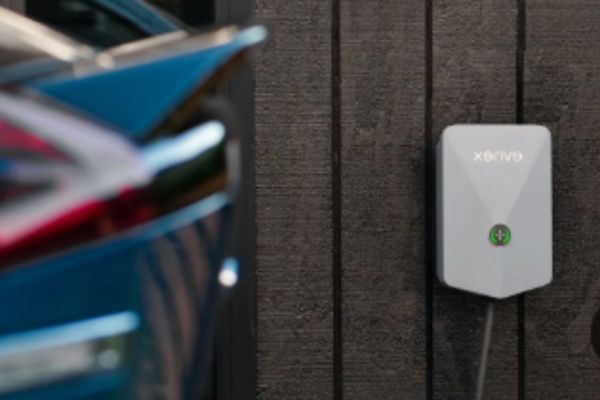
Future Directions in EV Charging
Upcoming Innovations and Products in the EV Charging Space
The EV charging industry is on the brink of several transformative innovations. One of the most exciting prospects is the development of ultra-fast charging technology, which aims to reduce charging times dramatically, making them comparable to the time it takes to fill a gas tank.
Enhancing wireless charging capabilities, which eliminates the need for cords and plugs, is another anticipated innovation.
The potential for smart grid integration and advancements in technology is significant.
Smart grid integration represents a significant frontier for EV charging technology. This integration allows EV chargers to communicate with the power grid to determine the best times to charge based on electricity demand and rates.
Additionally, vehicle-to-grid (V2G) technology is emerging, which enables EVs to return energy to the grid during peak times, effectively using vehicles as mobile energy storage units. These technologies not only optimize energy use and reduce costs, but also enhance grid stability and increase the penetration of renewable energy sources.
FAQs
Frequently Asked Questions Concerning the Purchase and Utilization of Smart EV Chargers
What should I consider when choosing a smart EV charger?
Evaluate the charger’s power output and compatibility with your vehicle, installation requirements, smart features such as app integration and scheduling, and whether it meets local regulations and standards.
How does installation work? Do I need a professional?
While some EV chargers are designed for DIY installation, most high-power models require professional installation to ensure they are connected safely and comply with local electrical codes. It’s often best to hire a certified electrician.
Can I use a smart EV charger with solar panels?
Yes, many smart EV chargers can integrate with home solar panel systems, allowing you to use renewable energy to charge your car. Check for chargers that specifically support solar integration.
What are the costs involved with running an EV charger at home?
The package includes the initial charger purchase and installation, as well as ongoing electricity costs. Smart chargers can help minimize these by allowing you to charge during off-peak hours when rates are lower.
How do I maintain my EV charger?
Maintenance generally involves regular inspections to ensure the unit is clean and free from debris, checking for software updates, and testing the unit to ensure all components are functioning correctly.
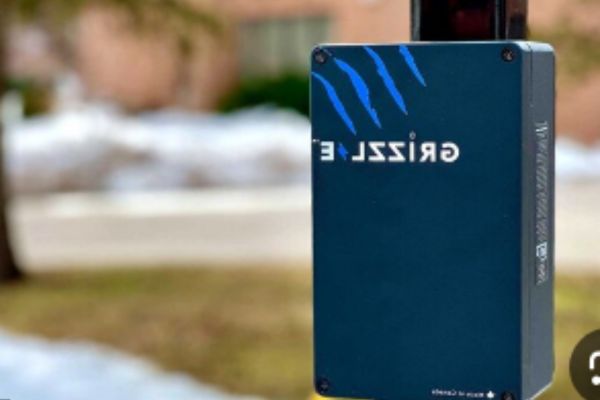
Conclusion
In summary, the realm of smart EV chargers is rapidly evolving with advancements in technology that promise faster, more efficient, and more integrated charging solutions. These chargers not only offer convenience through features like scheduled charging and real-time monitoring, but they also improve energy management via smart grid and solar integration. Safety and reliability remain paramount, with modern chargers incorporating robust safety features to ensure secure operation under various environmental conditions.
The recommendations are based on different needs and budgets.
- For budget-conscious buyers, look for basic models that still offer essential smart features like scheduling and usage monitoring. Take advantage of rebates and incentives to reduce costs.
- For tech-savvy users, opt for high-end models with advanced features such as integration with home automation systems, real-time energy management, and the potential for V2G technology.
- For environmentally conscious consumers, choose chargers that support solar integration and are made from sustainable materials.
Additional readings and resources
ChargePoint Home Flex: For more detailed information on the ChargePoint Home Flex charger, visit the official ChargePoint website: ChargePoint Home Flex
On the official Tesla website, learn about the features and specifications of the Tesla Wall Connector.
Emporia Smart EV Charger: To learn more about the Emporia Smart EV Charger and its capabilities, visit the Emporia Energy website. Emporia Smart EV Charger
FLO Home X5 Visit the FLO website to learn more about the FLO Home X5 charger and its advanced features.
Subscription Link for Newsletters and Updates:
Stay informed about the latest developments in charging technologies and EV trends by subscribing to newsletters and updates from leading industry sources:
Subscribe to the ChargePoint newsletter for updates on new charging technologies, EV industry news, and EV owners’ tips. Subscribe to the ChargePoint Newsletter.
Tesla Newsletter: Subscribe to Tesla’s newsletter to stay up-to-date on the latest news and announcements. Tesla Newsletter Subscription
Electric Vehicle Association (EVA) Newsletter: Join the Electric Vehicle Association (EVA) newsletter to receive updates on EV advancements, charging infrastructure, and industry events. EVA Newsletter Subscription
Sign up for the Green Car Reports newsletter to receive the latest news, reviews, and insights on electric vehicles and sustainable transportation. Subscribe to the Green Car Reports Newsletter.
By subscribing to these newsletters, you’ll stay informed about the latest developments in EV charging technologies and industry trends, ensuring you’re always up-to-date with the rapidly evolving landscape of electric transportation.

Henry Michael is a leading expert in EV charging station research, specializing in innovative solutions for electric vehicle infrastructure. With a passion for sustainability and technological advancement, he is dedicated to advancing the accessibility and efficiency of EV charging worldwide.
